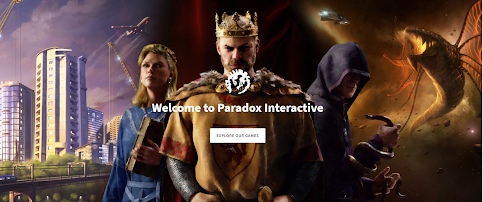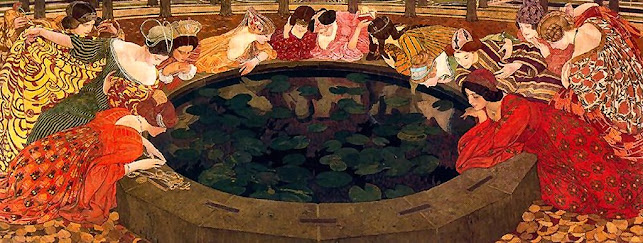Paradox Interactive Worldbuilding
I have long been fascinated with the idea of domain play and games in which players can make an impact on the world, not simply act as the main characters in a movie. What happens when the movie is over? How will the characters be remembered when they are gone? Who will remember them? As a GM I hope to provide the players with an experience in meaning making that allows them to build a legacy.
In order to have a game in which it is possible for players to affect history greater detail and care are required in worldbuilding. For players to feel the weight of their actions and receive a feeling of true accomplishment, the world needs to exist in as tangible a sense as possible. This kind of a game requires not only detail, but verisimilitude and objective systems. Players need to know that their actions will succeed or fail based on the objective rules of the imagined world rather than the whims of an idle god (or GM).
I have for several years now favored setting my fantasy games in historical versions of our own Earth. There is more detail and depth in the real world than any game setting could ever use. Nothing is more objective than reality. Players ought to have plenty of experience with reality too - no problems with low-fidelity dream logic futzing with the ability to make plans. So what's all this about video games then?
Paradox Interactive makes historical strategy simulation games like Crusader Kings 3 and Europa Universalis 4. I think that these games might be useful to help simulate the background state of politics, diplomacy and economics in order to help the GM flesh out their worlds. Even when a GM is willing to do historical research to find out as much as possible about a given setting, often there just isn't much historical detail available. The beauty of a game like Crusader Kings is that is generates county level leaders for the whole map and systems of vassalage for the entire aristocracy. Within each county the major settlements will have an assigned ruler and each noble's court will be populated with NPCs each with their own statistics. When players need to know who rules a location rather than the GM needing to pull an answer from their... let's say thin air, they can simply find that information. For smaller settlements or holdings that go beyond the scope of the game list of courtiers are excellents sources for NPCs players might encounter.
The best part about this is that the NPCs are rich with information. Each has personality traits, attributes and opinions of every other character. They have relationships and children and social status. There are alternative methods to automatically generate information like ChatGPT or other LLMs but the problem with them is that these programs have a limited context window so the information generated does not bear a systematic relationship with each other part of the world. Using a video game ensures that everything connects and references itself. With this kind of information think of the kinds of stories we can enable!
One issue for RPGs generally and domain play specifically is how to link the player's actions to wider world. There are numerous pen and paper RPG systems that allow you to build rival factions at various scales, ACKS being one good example. Let's say you have a game which reaches domain play. The players are able to establish a base and start to project power and influence toward the wider world. They make allies and enemies and gain followers. It is possible to generate a few enemy and allied factions but there is a point at which a person needs to set aside the spreadsheets and play.
What happens when the players want to know who is the ally of their ally? What about the people across the bay? Who rules them? Can we negotiate a treaty? What is the relative strength of our region and theirs? A good simulation game can provide answers to these questions. This is of particular value for time periods for which there is a dearth of written records. Don't know who controlled Chichester in 1048? Well the game will tell you (Godwine, Earl of Wessex).
Crusader Kings is the gold standard here: it focuses on individual rulers and so directly helps to model NPCs. It also allows players to set their starting dates in a wide variety of years between 769 and 1337. In theory you could run the simulation up to 1453 but letting the game run for any significant period of years can cause it to diverge quite drastically from actual history. Personally I've only played CK2, but CK3 is highly regarded as well and though it doesn't have quite as much expansion content it seems likely to eventually surpass its predecessor.
There are other games that cover non-medieval time periods, with Europa Universalis 4 covering the early modern period. It does not have the same focus on individual rulers but it could still provide some good background information about various regions and their relative strengths and economics.
I'm going to anticipate a few criticisms of this idea and then give my own anticipated problems in using this technique. I would imagine there are some readers who might ask: "Why does everything have to be computer-generated? Isn't this just a bad way of making people play a video game? Can't you come up with better ideas than a computer?"
To these and similar critiques I would answer that computer-generated content that is not helpful is in no way compulsory. In the same way that the GM is not required to use outcomes of random table that don't make sense- you don't have to use everything. This system simply provides a depth and breadth of knowledge not possible when generating all your own content.
What happens when the players start to affect the world? The video game can't update to take into account the changes players make at an analogue table. This is a true limitation of the idea. There are a few other incompatibilities. First, the time scale of most of the relevant Paradox games is measured in centuries and the minimum amount of time to do most things is measured in months. Another problem with scale is in power and status. Most RPG characters who reach domain level begin on the level of barons or thegns, not counts or dukes, but baronate-level powers are modelled much less thoroughly than counties. The barons themselves exist but their holdings mostly consist of numerical statistics that they provide to county-level lieges.
The most obvious way to handle these limitations is to use the game to generate a snapshot of the world state at the beginning of your campaign. It might be possible to allow the simulation to run for some period to present a dynamic background to your players, especially when running campaigns with longer time scales. One situation that could be particularly useful is if you want to represent a war as campaign background and don't want to use GM fiat to determine the outcome. There are some interesting possibilities for playing with real players acting as NPC patrons in the larger political sphere as well. Chances are, however that once players start making significant impact on the larger world that the table RPG and computer simulation will rapidly diverge.
If anyone has attempted to experiment with this type of content generation I would love to hear about it. I find this kind of thing fascinating.








Comments
Post a Comment